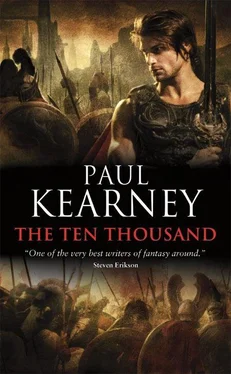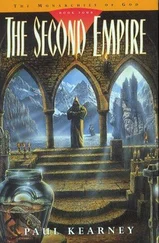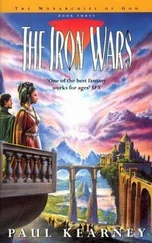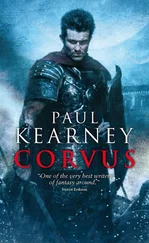Paul Kearney - The ten thousand
Здесь есть возможность читать онлайн «Paul Kearney - The ten thousand» весь текст электронной книги совершенно бесплатно (целиком полную версию без сокращений). В некоторых случаях можно слушать аудио, скачать через торрент в формате fb2 и присутствует краткое содержание. Жанр: Фэнтези, на английском языке. Описание произведения, (предисловие) а так же отзывы посетителей доступны на портале библиотеки ЛибКат.
- Название:The ten thousand
- Автор:
- Жанр:
- Год:неизвестен
- ISBN:нет данных
- Рейтинг книги:5 / 5. Голосов: 1
-
Избранное:Добавить в избранное
- Отзывы:
-
Ваша оценка:
- 100
- 1
- 2
- 3
- 4
- 5
The ten thousand: краткое содержание, описание и аннотация
Предлагаем к чтению аннотацию, описание, краткое содержание или предисловие (зависит от того, что написал сам автор книги «The ten thousand»). Если вы не нашли необходимую информацию о книге — напишите в комментариях, мы постараемся отыскать её.
The ten thousand — читать онлайн бесплатно полную книгу (весь текст) целиком
Ниже представлен текст книги, разбитый по страницам. Система сохранения места последней прочитанной страницы, позволяет с удобством читать онлайн бесплатно книгу «The ten thousand», без необходимости каждый раз заново искать на чём Вы остановились. Поставьте закладку, и сможете в любой момент перейти на страницу, на которой закончили чтение.
Интервал:
Закладка:
They stood upon the wall, watching while the goatmen bundled up the belongings of their dead comrades. When they were done, the three bodies lay nude in the snow, their hairy nakedness taking on a bluish tinge already. Then, without ceremony, the five survivors took off, the leg-hurt one hobbling and hissing in the rear. They turned a corner of the ruins and disappeared.
“They may hide and ambush us,” Rictus said. “I would.”
“You and your friend have put fear in them,” the fat merchant said. “I know these sorts. I come from Scanion, in the deep mountains. We used to hunt them like they were boar. Good sport, if you’ve a strong stomach. They’re brave when they’re in numbers, with an easy kill in sight, but you kill one or two and the rest lose heart right quick, like vorine. This pack is spent. Though what they’re doing so close to Machran is anybody’s guess. I’ve never met them so low.” And then, “Boy, that leg of yours needs attended.”
Gasca took off his helm and closed his eyes as the cold air cooled the sweat on his head. “You saved my life between you. I am in your debt now.”
“You saved mine by standing there,” the fat merchant grunted. “Do not speak of debt to me.”
“Nor me,” Rictus said. “You took that first javelin on your shield when it was aimed my way.”
Gasca and Rictus looked at one another. Both their hands rose in the same moment, and in the next they grasped each other’s wrists in the warrior salute, smiling, seeming not much more than boys.
“Of course, you did piss yourself,” Rictus said.
FOUR
There was a legend that the Macht had once been ruled by a single King, a mighty soldier, a just ruler, an architect of ambition and vision. He had gathered together all the scattered cities of his empire and connected them with a series of great roads, hewn with titanic labour out of the very faces of the mountains. Bas Mathon on the coast, he had linked to Gan Cras in the very heart of the Harukush range. Thousands of pasangs of highway he had carved across the northern world, the better to speed the passage of his messengers, his governors, his armies. But they also sped the feet of his enemies. An unruly, restless and stiff-necked people, the Macht had overthrown him, broken down his palace at Machran, and splintered his empire into a hundred, two hundred different vying polities. The cities had elected their own rulers, one by one. They had forged alliances and broken them, and they had bludgeoned their own passage through history, heedless of any larger call on their allegiances. The empire of the Macht was no more; the idea of a single King ruling all the great cities of the Harukush came to seem fantastic, then risible; a tale to he scoffed at in taverns. But the roads still stood. Some fell into disrepair, but the most important ones survived, and men still walked them to trade their wares and make their wars and indulge the lust of their wanderings. The King who had made them became a figure of myth, and in time even his name was forgotten, and the stones he had set up to commemorate it were worn smooth by the wind and rain of centuries.
The greatest of these roads led to the city of Machran, which had once been the capital of this vanished empire. Even today, it was the most populous and formidable of all the Macht city-states, and almost alone out of all others it had never fallen to siege or assault. What central institutions the Macht as a people possessed were housed in Machran, and competing cities might send embassies there for mediation, or to hire mercenary spearmen to bolster their flagging battle lines. For Machran attracted the shiftless, the penniless, the adventurous, and the downright criminal in ways no other city could, and these men put up their services for sale at the great hiring fairs held thrice yearly. In Machran, it was said, everything was for sale, and a man might find himself bought and sold there before he knew it.
The road which Gasca and his companions had tramped for so many days came to an end at the grey walls of the city. Once faced with white marble, the battlements had been battered by the centuries and the greedy hands of men. Now most of the good marble had gone except for yellowing pockets here and there, lonely teeth in a blackened mouth. For all that, the walls were impressive, perhaps five times a tall man’s height, the gatehouse in which the road ended twice that. Gasca could glimpse the wood and iron scaffolds of ancient war machines atop the wall-towers. Ballistas and mangonels and other engines which were but half-known names to him. The flitting sunlight snapped in spikes off the bronze of helms and spearheads as sentries paced the catwalks.
The road broadened into a muddy field before the towering gatehouse, the stone flags of it lost in ankle-deep mud and the droppings of every animal tamed by man. Carts, wagons, and pack mules stood surrounded by a jabbering crowd of men, women, and children who glared and talked and gesticulated and seemed on the point of some communal violence while the bored guards in the gateway waved them through, beating the slower beasts of burden with the flat of their spearheads. Gasca, Rictus, and their company were swallowed up in this crowd, repaying thumps and shoves with interest until they had passed through the dark echo of the gatehouse itself. On the other side the city reared up over them, as sudden and startling to witness as a precipice. They stumbled out of the way of the entering hordes and gathered themselves together, a final headcount. Gasca bent his head back and gaped without shame, a perfect picture of the country boy in town for the day-if one ignored the armour on his back and the weapons he bore.
Well, he thought, there is, at least, no shit rolling down the middle of the street.
The company was scattering. The procuress actually kissed Gasca on the mouth, then cackled and strode off, the urchin children now secured to her waist with thin lengths of cord. These were so cowed by the sight of the great city however that they clung to her side. She was taking them to the slave-market in the Goshen Quarter. One child turned and waved at Gasca as he went, huge frightened eyes in a filthy face.
The young husbands shook his hand one after the other in the finger-grip of the artisan. Their wives had donned veils, the informality of the road abandoned, and they were as demure as matrons now. No more squealing in the blankets by a campfire for them.
The thin merchant spoke briefly to his colleague and departed without a word for the men who had bled for him. He was perhaps still bemoaning his lost ass.
“Ungrateful sod,” Rictus said mildly.
“You boys will stay with me until you can shift for yourselves,” the fat merchant said. “I will hear of nothing else. On the Street of Lamps, in the Round Hill Quarter, you must go to the Beggar’s Purse, nigh the amphion, the speaker’s place, and tell them that you are guests of Zeno of Scanion. You tell them that, and you’ll save yourself an obol or two. I will meet you there later and we shall wet our throats in memory of the Defence of Memnos.” He grinned.
“Zeno of Scanion,” Gasca said, smiling, “it shall be so.”
“Ah! Till later then. Be careful, boys. No goat-men here, but plenty of jackals. One hand to your money and the other on a good knife.”
Zeno-now they knew his name at least-left them with a wink and a wave. He was bowed under a heavy pack, for the goatmen, though they had slaughtered the donkeys, had not had the time to loot all the merchants’ wares.
Staring, Rictus and Gasca moved aside to let the torrent of humanity move past and around them. On all sides, like white cliffs, buildings rose faced with marble. The streets were shadowed by them, made into narrow channels through which the people of the city flowed and whirled and turned. Rictus and Gasca were like twigs in a millrace, snagged for a moment by their own irresolution while the current broke around them.
Читать дальшеИнтервал:
Закладка:
Похожие книги на «The ten thousand»
Представляем Вашему вниманию похожие книги на «The ten thousand» списком для выбора. Мы отобрали схожую по названию и смыслу литературу в надежде предоставить читателям больше вариантов отыскать новые, интересные, ещё непрочитанные произведения.
Обсуждение, отзывы о книге «The ten thousand» и просто собственные мнения читателей. Оставьте ваши комментарии, напишите, что Вы думаете о произведении, его смысле или главных героях. Укажите что конкретно понравилось, а что нет, и почему Вы так считаете.












